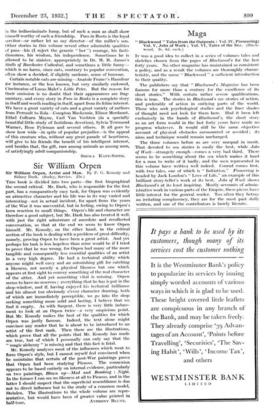Maga
IT was a good idea to collect in a series of volumes tales and sketches chosen from the pages of Bkzelarood's for the last forty years. No other magazine has maintained so consistent a policy, and as a result the volumes are thoroughly charac- teristic, and the name " Blackwood " a sufficient introduction to their quality.
The publishers say that "Black-wood's Magazine has been famous for more than a century for the excellence of its short stories." With certain rather severe qualifications, this is true. The stories in Blackwood's are stories of action, and preferably of action in outlying parts of the world. Those who seek psychological studies and the finer shades of thought need not look for them here. Had it been left exclusively in the hands of Blackwood's, the short story as an art form would in the last forty years have made no progress whatever. It would still be the same objective account of physical obstacles surmounted or avoided ; its aims and technique would remain unchanged.
The three volumes before us arc very unequal in merit. That devoted to sea stories is easily the best, while Jobs of Work—strangely enough—comes a very bad third. There seems to be something about the sea which makes it hard for a man to write of it badly, and the men represented in this volume have written well indeed. Conrad comes first with two tales, one of which is "Initiation." Pioneering is headed by Jack London's "Love of Life," an example of this brilliant story-teller's work at its best. Jobs of Work shows Blackwood's at its least inspiring. Mostly accounts of admin- istrative work in various parts of the Empire, these pieces have little interest for the general reader. Too often they betray an irritating complacency, they are for the most part dully written, and one of the contributors is barely literate.


























 Previous page
Previous page